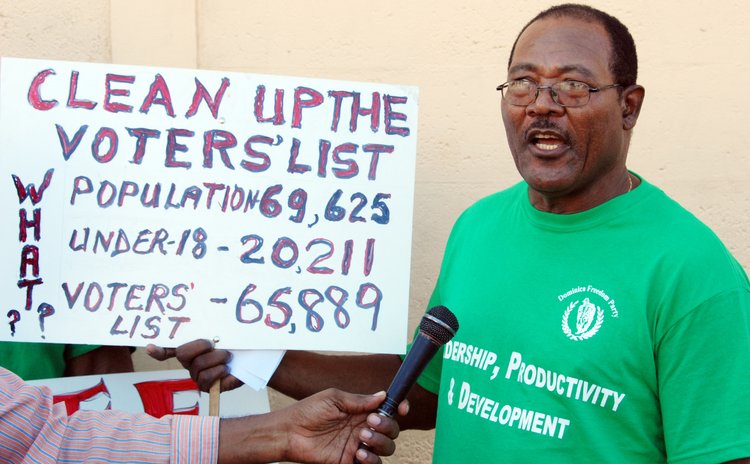Please note that we are about to hold another election without electoral reform

Dominica is again preparing for an election but the electoral reform process that has eluded the country for decades is still caught in the quicksand of political chicanery.
Honourable Edward Registe died on the job, on 1st. September 2021, as parliamentary representative for Grand Bay and in keeping with the Constitution, a by-election must be held within 90 days after a parliamentary seat becomes vacant. Hence, there are less than 60 days left before the 2021 Grand Bay bye-election and therefore, we have absolutely no chance for electoral reform before the people of Grand Bay return to the polls to elect a new parliamentary representative.
Unfortunately, this Grand Bay bye-election will be contested without basic change to the requirements for conducting elections: without the cleansing of the voters' list, without the issuance of voter identification cards, and without enforceable campaign finance legislation.
In our view, all Dominicans should be hanging their heads in shame because we have taken decades to agree on a process that most Caribbean democracies do without fanfare. We seem to be so caught up in political partisanship that we cannot agree on the simple things that must be done to maintain our democracy, regardless of party affiliation. Electoral reform should never become be a party thing; it should not be a Dominica Labour Party (DLP) or a United Workers Party (UWP) issue but Dominica must achieve electoral reform if it is still a modern democracy.
Of course, the results of any election in Grand Bay are as predictable as the next sunrise. That is not the issue. For all elections to be considered free and fair these elections must meet basic minimum standards such as sanitised voters' lists, voter identification cards, and a level playing field brought about by campaign finance legislation.
By the way, on the issue of campaign finance legislation, Dominicans should note that ex-president of France, Nicolas Sarkozy, was last week found guilty of illegally financing his 2012 presidential bid by exceeding France's strict electoral rules and was sentenced to a year of house arrest. Apparently, Sarkozy spent much more on his re-election campaign than the law allowed him to. Dominica needs laws like these because we cannot have so-called "fair elections" when one party is allowed to spend hundreds of millions of dollars and others just a few thousand. The election playing field in Dominica must be bulldozed and levelled. The bigger, and more frightening question, is: who has purchased our politicians? But we digress.
It is a no-brainer that the Dominica Labour Party candidate, whoever Prime Minister Roosevelt Skerrit finally selects for that bye-election, will win but it is a bit disconcerting that not even the DLP has announced its candidate. What does that tell us about the ruling DLP? But that's another story.
DLP will win this by-election because the people of Grand Bay have decided for decades that they will trust their future to the DLP in spite of the fact that that village has not made much progress over the past decades. In fact, in the general election of 2019, Registe won 1532 votes to the UWP's candidate 211; in 2014 Justina Charles of the DLP won 1426 votes to the UWP's 327; in 2009 Charles won 1350 and her UWP rival recorded only 119; in 2005 the late John Fabien won with 1409 votes and the UWP received 294.
In this Grand Bay bye-election expect voter turnout to be extremely low. Of course, COVID-19 will have a significant impact on the turnout but traditionally voters do not turn out to vote in bye-elections that will not have an impact on the government's occupation of the seats of power.
The point is the bye-election in Grand Bay will have no impact on the government's parliamentary majority. But since it will be contested without electoral reform, the widespread impression that this current government continues to govern following elections that were unfair will continue.
In the meantime, we anxiously await the report and recommendations from Sir Dennis Byron, the one-man Commission on Electoral Reform although the route of the flight that the Sir Byron Commission has taken has been clearly outlined by thousands of words from all opposition political parties, the Joint CARICOM- Commonwealth- OAS Special Mission to Dominica of August 6-9, 2019; the many unimplemented decisions of the Gerald Burton Electoral Commission; the Mia Mottley report; the Commonwealth Observer Mission; the Organisation of American States (OAS) Electoral Observer Mission of 2014; the Electoral Reform Effort Group, which comprises of the church, business, trade unions, and civil society leaders, among many others.
For instance, the main opposition United Workers Party (UWP) said many years ago, and reiterated during the 2019 election campaign, that it demands: a total re-registration of all eligible voters on the basis of which a new register of voters would be issued; voter identification cards - picture ID cards for all eligible voters on the new register of voters who will be obligated to use the cards as identification during elections; enforcement of the provisions in electoral laws against bribery, treating, personation, illegal voting and election offenses in general.
On the other hand, the specifics of the demands of the ruling Dominica Labour Party (DLP), are unclear. In fact, judging from the public statements of leaders of the DLP, that party may have reluctantly entered the election reform process. It is clearly not interested.
For example, Prime Minister Roosevelt Skerrit said a few years ago that the DLP Government that he leads "is confident that the electoral laws of Dominica and the election process as a whole has always produced elections which are free and fair and the results truly reflect the wish of the Dominican electorate".
In other words, the position of the DLP appears to be: if the system isn't broken, why risk fixing it and then lose elections.




